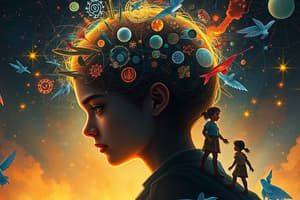Podcast
Questions and Answers
What are the four stages of cognitive development proposed by Piaget?
What are the four stages of cognitive development proposed by Piaget?
- Concrete thinking stage, Abstract thinking stage, Metacognitive stage, Logical thinking stage
- Intuitive stage, Formal operations stage, Logical operations stage, Sensory operations stage
- Sensorimotor stage, Preoperational stage, Concrete operational stage, Formal operations stage (correct)
- Preconventional stage, Conventional stage, Postconventional stage, Abstract stage
Which theory emphasizes the importance of achieving independence and developing a sense of identity during adolescence?
Which theory emphasizes the importance of achieving independence and developing a sense of identity during adolescence?
- Skinner's behaviorist theory
- Freud's psychosexual theory
- Kohlberg's moral development theory
- Erikson's psychosocial theory (correct)
What is a key challenge that adolescents often face according to the text?
What is a key challenge that adolescents often face according to the text?
- Decreased social interactions
- Increased emotional stability
- Decreased risk-taking behavior
- Identity exploration (correct)
Which aspect of human development involves a person's ability to think, reason, and make decisions?
Which aspect of human development involves a person's ability to think, reason, and make decisions?
What is one of the characteristics often associated with infants in terms of emotional development?
What is one of the characteristics often associated with infants in terms of emotional development?
At what different life stages do individuals experience cognitive, emotional, and social changes according to the provided text?
At what different life stages do individuals experience cognitive, emotional, and social changes according to the provided text?
What is the main focus of Kohlberg's theory?
What is the main focus of Kohlberg's theory?
Which aspect plays a significant role in shaping who children become later in life, according to the text?
Which aspect plays a significant role in shaping who children become later in life, according to the text?
In emotional development, what basic emotions naturally emerge in infants?
In emotional development, what basic emotions naturally emerge in infants?
What does Bowlby's attachment theory suggest promotes healthy development?
What does Bowlby's attachment theory suggest promotes healthy development?
Which theory explains how humans cope with the awareness of mortality?
Which theory explains how humans cope with the awareness of mortality?
Why do partings become more profound as individuals age?
Why do partings become more profound as individuals age?
Flashcards are hidden until you start studying
Study Notes
Developmental Psychology is a field of study that focuses on understanding how people change throughout their lives by examining various stages from infancy through childhood, adolescence, and into older age. It's concerned with understanding growth processes related to cognition, socialization, emotion regulation, personality formation, moral reasoning, and identity development. Here, we will explore some key aspects within this vast realm of human development, including cognitive, emotional, and social changes across different life stages from birth until death.
Cognitive Development: This aspect involves a person's ability to think, reason, solve problems, learn, remember, and make decisions. Beginning in early childhood, children go through milestones in their intellectual growth such as Piaget's four stages of cognitive development, which include sensorimotor stage, preoperational stage, concrete operational stage, and formal operations stage. As individuals grow older, they continue developing these skills into more complex forms of thinking like abstract conceptualization and metacognition.
Adolescent Psychology: Adolescents are often characterized by dramatic physical and psychological changes. This period brings challenges like identity exploration, peer pressure, and increased risk-taking behavior. Erikson's theory describes two primary tasks during this phase: achieving independence versus becoming overly self-absorbed or identity diffusion. Additionally, Kohlberg's theory explains progression towards higher levels of moral reasoning as teenagers enter young adulthood.
Child Development: From conception to early childhood, children experience rapid brain development and sensory experiences shaping who they become later in life. Language acquisition, motor skills, social interactions all play significant roles during this time frame. Bowlby's attachment theory suggests secure relationships between caregivers and babies promote healthy development.
Emotional Development: Understanding emotions helps us navigate our world effectively. In infants, basic emotions like joy, sadness, fear, anger, disgust, and surprise emerge naturally; however, it takes years before children develop more sophisticated abilities to regulate them. Children also acquire the capacity to empathize and display compassion, fostering stronger bonds with others.
Finally, let's consider Infancy to Death and Dying. We begin life full of potential and end it with the accumulation of memories, experiences, and knowledge. However, the process isn't always smooth sailing - many factors influence our health, wellbeing, and quality of life, particularly near the ends of it. For instance, theories like Terror Management explain how humans cope with the awareness of mortality. Moreover, the impact of loss grows deeper as we age due to lifelong bonding with loved ones, making partings more profound than ever before.
In summary, Developmental Psychology covers a broad spectrum of human life stages marked by significant transformations physically, intellectually, emotionally, socially, and psychologically. By exploring these areas further, researchers gain valuable insights into what makes each individual unique while simultaneously identifying universal principles governing our collective growth journey from cradle to grave.
Studying That Suits You
Use AI to generate personalized quizzes and flashcards to suit your learning preferences.




